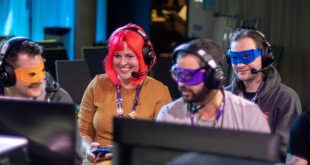 Joe Sutcliffe, recruiter at Aardvark Swift, tells us what recruitment market looks like in video games right now, and how his agency can help people looking for new studios to work at.
Joe Sutcliffe, recruiter at Aardvark Swift, tells us what recruitment market looks like in video games right now, and how his agency can help people looking for new studios to work at.
What sets Aardvark Swift apart from other recruitment agencies?
We take the time to understand what our studio partners are looking for when recruiting, to ensure we speak with devs who fit both the skill set and also the studio culture and the project. This coupled with the relationships and knowledge we’ve built over 30+ years working with the industry stands us in good stead to help devs and studios alike.
Another element that sets us apart from our peers is our Grads in Games initiative which helps aspiring game devs enter the industry. Our graduate recruiters run events at universities and online in conjunction with studios and developers to help improve the employability of games grads.
What does the recruitment market look like currently, in the games industry?
There’s been a noticeable shift in the market regarding remote work. A lot of studios have moved back to onsite or hybrid working as a requirement. Even with the recent market turbulence, the need from studios to hire is still there, albeit not at the same level as we’ve seen over the past couple of years.
The recent spates of redundancy and studio closures in the industry are unsettling and are an indication that the industry is not as buoyant as in recent years, and that the challenging global circumstances facing other industries are beginning to affect the games industry as well. The industry is also well placed to recover, being used to adapting to challenges.
What are some perks available to professionals working at the studios you recruit for?
We’ve seen a shift to studios recognising the need to provide leave and health benefit options that appeal to their team members both personally and to their immediate family, and not simply discounted gym membership. We would encourage a degree of flexibility with perks and benefits where possible, allowing the team to choose what matters to them personally.
What should aspiring developers do with their CV to secure an interview?
In terms of CVs, it’s crucial to make relevant information easily accessible for hiring managers. The basics of including working portfolio links and contact details at the top of the page are key, a concise summary of relevant experience, projects, education, courses, and skill sets are a must. Avoid rating your skills, it’s far too subjective.
For those looking to transfer into the industry and make use of comparable skills we’d encourage contacting a recruitment agency, they’ll be well versed in the core skills of the different development disciplines and how transferrable certain skills are and advise what can be done to fill in any gaps.
Can you share a memorable positive interview experience?
Every placement we make is a positive experience for us! There have been some especially memorable ones for our team, and every once in a while, one does come up that really makes you smile, like when we helped a dev move to a specific location to be with their partner, reuniting them after a lengthy period living apart.
How does the international recruitment process work?
Understanding a studio’s requirements is crucial for a smooth recruitment process and vice versa what the developer themselves needs, ensuring they’ve considered all elements of the potential move, from local housing, culture and customs, schooling, cost of living as well as the obvious considerations around the role they’re moving to. Many studios offer support for a developer looking to relocate and we encourage studios to extend that support to the developer’s family to guide them through the process. In cases where the hiring studio is unable to support directly, we’re able to bring in expert assistance through links we have with Fragomen LLP who specialise in immigration law.

 MCV/DEVELOP News, events, research and jobs from the games industry
MCV/DEVELOP News, events, research and jobs from the games industry




